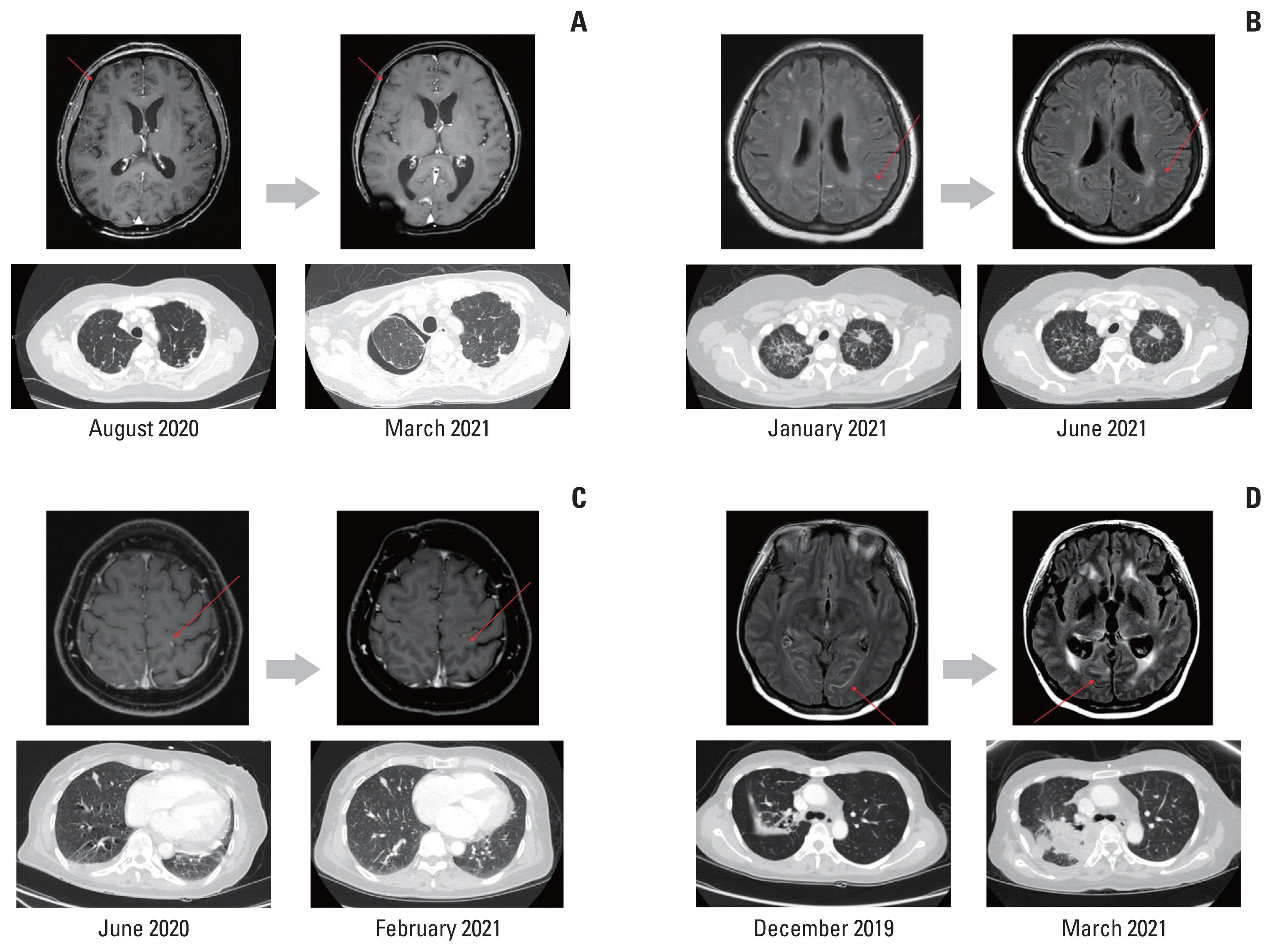Cancer Res Treat.
2023 Jan;55(1):344-349. 10.4143/crt.2021.1603.
Osimertinib Combined with Systemic Chemotherapy for EGFR Mutant, T790M-Negative, Non–Small Cell Lung Cancer Patients Who Develop Leptomeningeal Metastases with Extracranial Progression to Prior EGFR TKI
- Affiliations
-
- 1Division of Hematology-Oncology, Department of Medicine, Samsung Medical Center, Sungkyunkwan University School of Medicine, Seoul, Korea
- 2Department of Internal Medicine, Dong-A University College of Medicine, Busan, Korea
- KMID: 2538017
- DOI: http://doi.org/10.4143/crt.2021.1603
Abstract
- Leptomeningeal metastasis (LM) is a rare but fatal clinical condition with a short survival time. The incidence of LM from epidermal growth factor receptor mutant (EGFRm) non–small cell lung cancer (NSCLC) has increased due to the limited efficacy of first- or second-generation epidermal growth factor receptor (EGFR) tyrosine kinase inhibitors (TKIs) in the central nervous system (CNS). Osimertinib is a third-generation, irreversible, CNS penetrant, oral EGFR TKI that demonstrates promising efficacy in CNS metastases regardless of T790M. Herein, we report four cases of T790M-negative EGFRm NSCLC patients treated with osimertinib combined with systemic chemotherapy, who progressed on prior EGFR TKI and developed LM with extracranial lesions. The combination treatment was well tolerated, and the mean overall survival from LM diagnosis was 14.7 months (95% confidence interval, 10.4 to 19.0). These results suggest that osimertinib combined with systemic chemotherapy would be a reasonable treatment option for T790M-negative EGFRm NSCLC patients who develop LM with extracranial progression to prior EGFR TKI. A further prospective study is warranted.
Figure
Reference
-
References
1. Chamberlain MC. Leptomeningeal metastasis. Curr Opin Oncol. 2010; 22:627–35.
Article2. Li YS, Jiang BY, Yang JJ, Tu HY, Zhou Q, Guo WB, et al. Leptomeningeal metastases in patients with NSCLC with EGFR mutations. J Thorac Oncol. 2016; 11:1962–9.
Article3. Kuiper JL, Hendriks LE, van der Wekken AJ, de Langen AJ, Bahce I, Thunnissen E, et al. Treatment and survival of patients with EGFR-mutated non-small cell lung cancer and leptomeningeal metastasis: a retrospective cohort analysis. Lung Cancer. 2015; 89:255–61.
Article4. Taillibert S, Chamberlain MC. Leptomeningeal metastasis. Handb Clin Neurol. 2018; 149:169–204.
Article5. Chamberlain M, Soffietti R, Raizer J, Ruda R, Brandsma D, Boogerd W, et al. Leptomeningeal metastasis: a response assessment in neuro-oncology critical review of endpoints and response criteria of published randomized clinical trials. Neuro Oncol. 2014; 16:1176–85.
Article6. Umemura S, Tsubouchi K, Yoshioka H, Hotta K, Takigawa N, Fujiwara K, et al. Clinical outcome in patients with leptomeningeal metastasis from non-small cell lung cancer: Okayama Lung Cancer Study Group. Lung Cancer. 2012; 77:134–9.
Article7. Lee E, Keam B, Kim DW, Kim TM, Lee SH, Chung DH, et al. Erlotinib versus gefitinib for control of leptomeningeal carcinomatosis in non-small-cell lung cancer. J Thorac Oncol. 2013; 8:1069–74.
Article8. Mok TS, Wu YL, Ahn MJ, Garassino MC, Kim HR, Ramalingam SS, et al. Osimertinib or platinum-pemetrexed in EGFR T790M-positive lung cancer. N Engl J Med. 2017; 376:629–40.
Article9. Yang JC, Kim SW, Kim DW, Lee JS, Cho BC, Ahn JS, et al. Osimertinib in patients with epidermal growth factor receptor mutation-positive non-small-cell lung cancer and leptomeningeal metastases: the BLOOM study. J Clin Oncol. 2020; 38:538–47.
Article10. Ahn MJ, Chiu CH, Cheng Y, Han JY, Goldberg SB, Greystoke A, et al. Osimertinib for patients with leptomeningeal metastases associated with EGFR T790M-positive advanced NSCLC: the AURA leptomeningeal metastases analysis. J Thorac Oncol. 2020; 15:637–48.
Article11. Lee J, Choi Y, Han J, Park S, Jung HA, Su JM, et al. Osimertinib improves overall survival in patients with EGFR-mutated NSCLC with leptomeningeal metastases regardless of T790M mutational status. J Thorac Oncol. 2020; 15:1758–66.
Article12. Ballard P, Yates JW, Yang Z, Kim DW, Yang JC, Cantarini M, et al. Preclinical comparison of osimertinib with other EGFR-TKIs in EGFR-mutant NSCLC brain metastases models, and early evidence of clinical brain metastases activity. Clin Cancer Res. 2016; 22:5130–40.
Article13. Lu ZQ, Cai J, Wang X, Wei JP, Zeng ZM, Huang L, et al. Osimertinib combined with bevacizumab for leptomeningeal metastasis from EGFR-mutation non-small cell lung cancer: a phase II single-arm prospective clinical trial. Thorac Cancer. 2021; 12:172–80.
Article14. Yang Z, Guo Q, Wang Y, Chen K, Zhang L, Cheng Z, et al. AZD3759, a BBB-penetrating EGFR inhibitor for the treatment of EGFR mutant NSCLC with CNS metastases. Sci Transl Med. 2016; 8:368ra172.
Article15. Ahn MJ, Kim DW, Cho BC, Kim SW, Lee JS, Ahn JS, et al. Activity and safety of AZD3759 in EGFR-mutant non-small-cell lung cancer with CNS metastases (BLOOM): a phase 1, open-label, dose-escalation and dose-expansion study. Lancet Respir Med. 2017; 5:891–902.
Article
- Full Text Links
- Actions
-
Cited
- CITED
-
- Close
- Share
- Similar articles
-
- Lazertinib: on the Way to Its Throne
- Rare Mechanism of Acquired Resistance to Osimertinib in Korean Patients with EGFR-mutated Non-small Cell Lung Cancer
- Durable response to first-line treatment with AZD3759 (zorifertinib) in a patient with epithelial growth factor receptor mutated non-small cell lung cancer and untreated multiple brain metastasis
- The Role of Brain Radiotherapy before First-Line Afatinib Therapy, Compared to Gefitinib or Erlotinib, in Patients with EGFR-Mutant Non–Small Cell Lung Cancer
- EGFR C797S as a Resistance Mechanism of Lazertinib in Non-small Cell Lung Cancer with EGFR T790M Mutation


